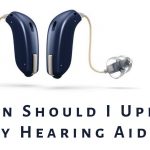Disabling hearing loss affects an estimated 466 million people worldwide, according to the World Health Organization, and the Hearing Loss Association of America tells us that approximately 48 million people are living with hearing loss in the United States alone.
Hearing aids are the most common treatment for the third most common medical condition in the U.S., behind arthritis and heart disease. The devices are custom fit to your specifications and the digital marvels can cost a consumer well into the thousands of dollars. Millions of people rely on hearing aids daily to perform well and it is important to know how to troubleshoot common problems.
Common Issues
One of four issues is usually the culprit when something is wrong with your hearing aid(s): they are not producing sound (or they are “dead”); they are not loud enough; they sound strange or distorted; or they are producing feedback.
Some troubleshooting tips follow, but if you are not able to fix them yourself, you may need to visit your audiologist or a board-certified hearing instrument specialist (BC-HIS) for maintenance or repair.
The hearing aids are dead or not producing sound
- Check that no earwax or other debris is blocking the microphone opening or sound outlet. If so, carefully clean away the blockage.
- Make sure the hearing aid has power, usually achieved by securely closing the battery compartment door. If it will not shut, check that the battery is inserted properly with the correct side up. The door should then close easily.
- Increase the volume on the device directly or by remote control to ensure it is all the way on.
- If all else fails, replace the battery. Confirm the old battery is dead with a hearing aid battery tester, if possible, before removing the sticker to activate a new one.
The hearing aids are not loud enough
- Thoroughly examine the hearing aids and check for earwax, debris, or other blockages in or around the microphone or sound outlet. If you have a behind-the-ear (BTE) model with ear mold and tubing, do a similar, thorough check for moisture, blockages, or cracks in the tubing. If the tubing needs to be replaced, contact your hearing specialist about available appointments.
- Increase the volume on the device directly or by remote control a few times so that you can hear the difference in volume.
- Try a different program or memory. You may have switched to a program different from your usual program accidentally.
- Consider scheduling a new hearing examination. It is possible that your hearing has changed since your current set of hearing aids and it may be time for a new fitting. Contact you hearing health care professional.
The hearing aids sound strange or distorted
- Examine your hearing aids for corrosion, replace if necessary.
- Examine the battery contracts. These metal prongs make contact with the battery when the door is closed and must also be free from corrosion. Try opening and closing the door several times to clean the contacts.
- Try a different program or memory. You may have switched to a program different from your usual program accidentally.
- Consider the possibility that your hearing aids may be damaged. Contact your hearing instrument specialist for further assistance.
The hearing aids are producing feedback
- Take the hearing aids out and reinsert them; they could be inserted improperly.
- Reduce the volume. There may be too much sound escaping through the vent or around the ear mold.
- If you believe earwax is to blame, schedule an appointment to have your ears cleaned thoroughly. This type of blockage can cause feedback in two ways:
- You increase the volume to hear through the blockage, or
- Sound can bounce off of a blockage in your ear and leak back out.
- If you have lost a great deal of weight recently, your hearing aids may not be a proper physical for any longer. Your hearing health care professional can determine if the fit can be adjusted or if new molds need to be made.
Conclusion
Troubleshooting problems before reaching out to a BC-HIS can save you time and familiarize yourself with the tiny marvels on which you rely from day to day. However, if you have no luck with these tips for common issues, reach out to your hearing health care professional and let the experts get your devices working properly again.





